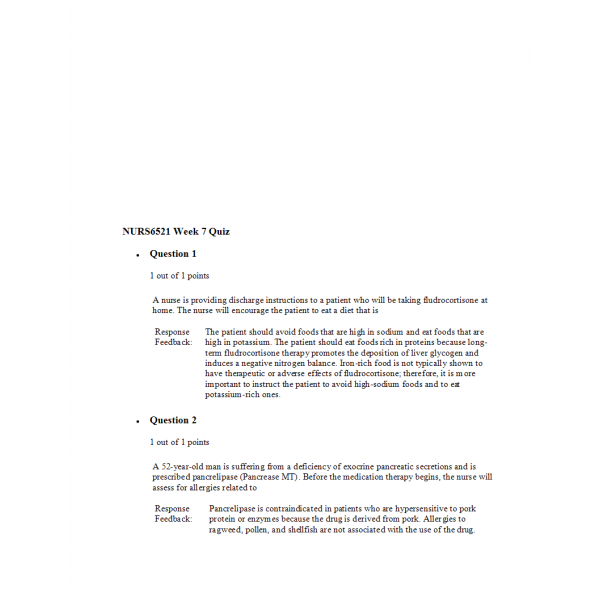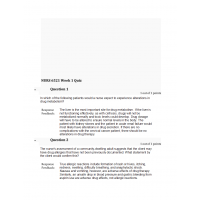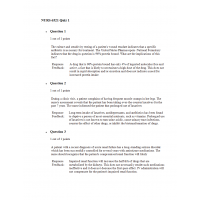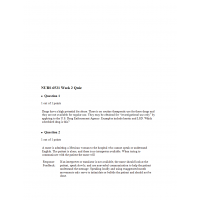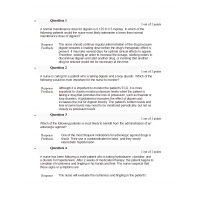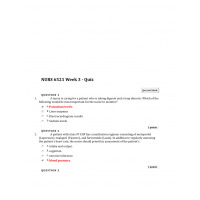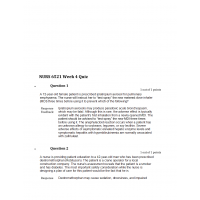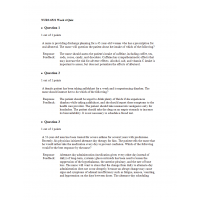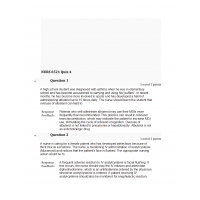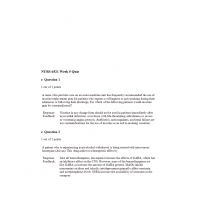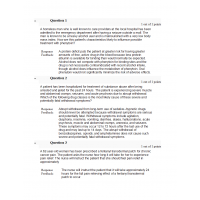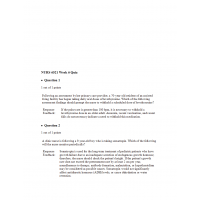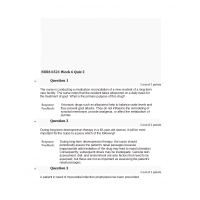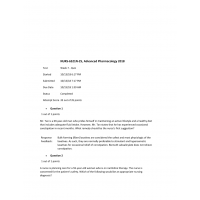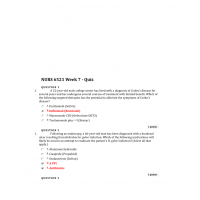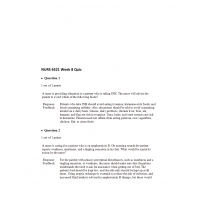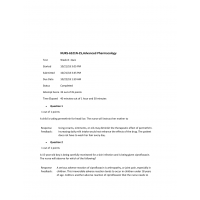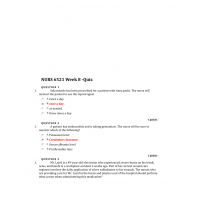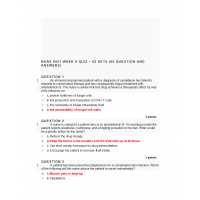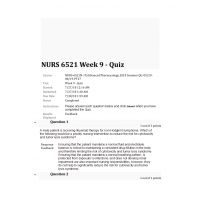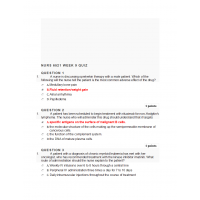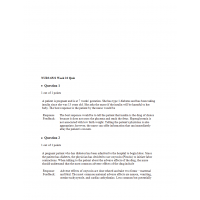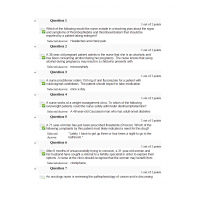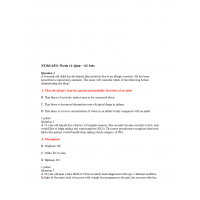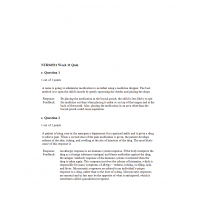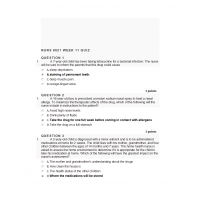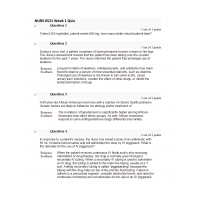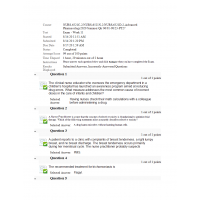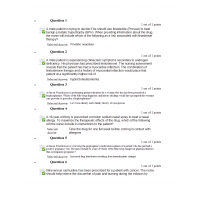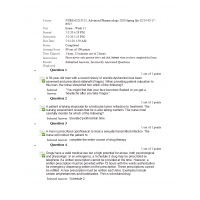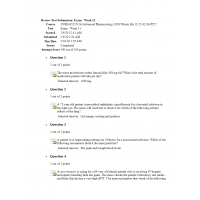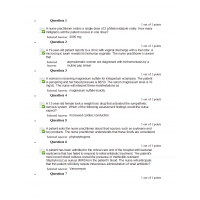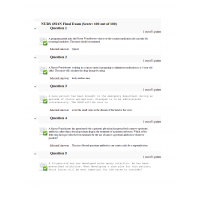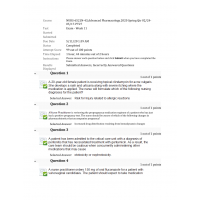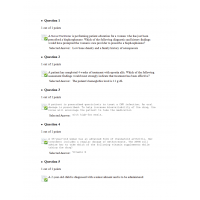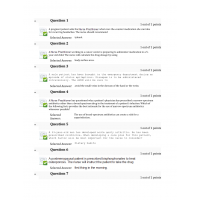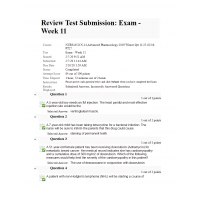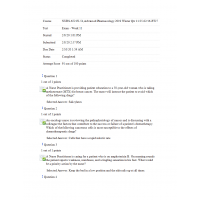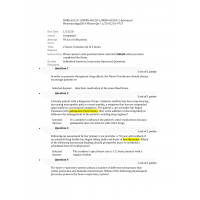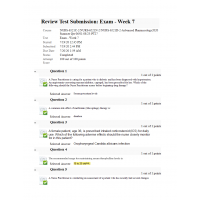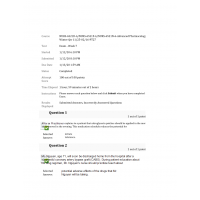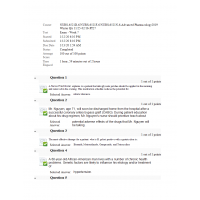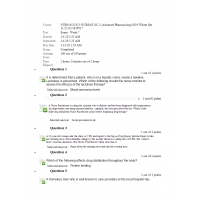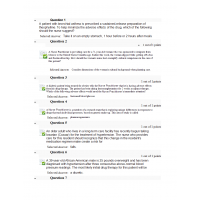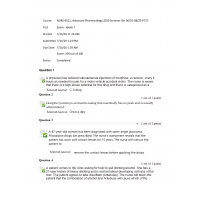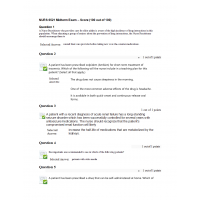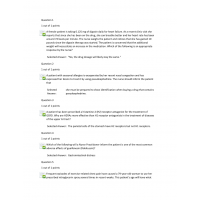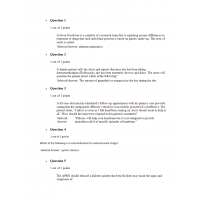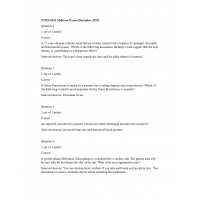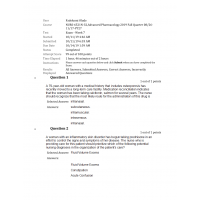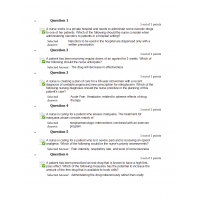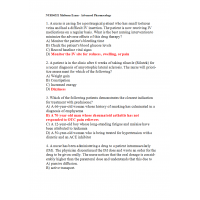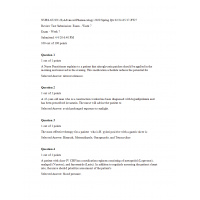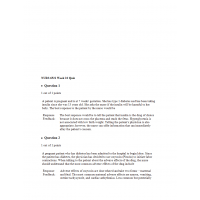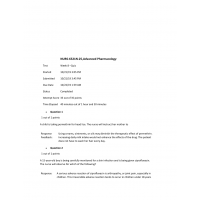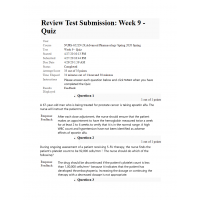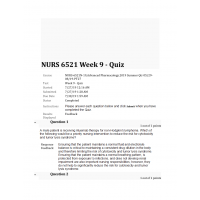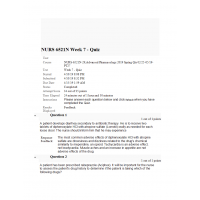NURS 6521N Week 7 Quiz 1
1. A nurse is providing discharge instructions to a patient who will be taking fludrocortisone at home. The nurse will encourage the patient to eat a diet that is
2. A 52-year-old man is suffering from a deficiency of exocrine pancreatic secretions and is prescribed pancrelipase (Pancrease MT). Before the medication therapy begins, the nurse will assess for allergies related to
3. A 58-year-old man is prescribed dicyclomine (Bentyl) for irritable bowel syndrome. In which of the following conditions is dicyclomine therapy contraindicated?
4. To maximize the therapeutic effect of diphenoxylateHCl with atropine sulfate, the nurse will instruct the patient to take the medication
5. A patient develops diarrhea secondary to antibiotic therapy. He is to receive two tablets of diphenoxylateHCl with atropine sulfate (Lomotil) orally as needed for each loose stool. The nurse should inform him that he may experience
6. A nurse is providing patient education for a patient who has been prescribed diphenoxylateHCl with atropine sulfate. Which of the following instructions would be important for self-administration of this drug?
7. A patient who is postoperative day one following a metatarsal amputation is experiencing nausea and vomiting. Consequently, the nurse has administered an intravenous dose of metoclopramide. This drug will relieve the patient's nausea by
8. A 60-year-old man has scheduled a follow-up appointment with his primary care provider stating that the omeprazole (Prilosec) which he was recently prescribed is ineffective. The patient states, “I take it as soon as I feel heartburn coming on, but it doesn't seem to help at all.” How should the nurse best respond to this patient's statement?
9. A clinic nurse is planning care for a 68-year-old man who has been on omeprazole (Prilosec) therapy for heartburn for some time. Regarding the patient's safety, which of the following would be a priority nursing action?
10. A teenage boy has undergone a diagnostic workup following several months of persistent, bloody diarrhea that appears to lack an infectious etiology. The boy has also experienced intermittent abdominal pain and has lost almost 15 pounds this year. Which of the following medications is most likely to treat this boy's diagnosis?
11. A 48-year-old woman who works as an office manager is prescribed metoclopramide (Reglan) for diabetic gastroparesis. The nurse will be sure to assess the patient for
12. A patient has been prescribed rabeprazole (Aciphex). It will be important for the nurse to assess the patient's drug history to determine if the patient is taking which of the following drugs?
13. Mr. Tan is a 69-year-old man who prides himself in maintaining an active lifestyle and a healthy diet that includes adequate fluid intake. However, Mr. Tan states that he has experienced occasional constipation in recent months. What remedy should be the nurse's first suggestion?
14. A 33-year-old woman has irritable bowel syndrome (IBS). The physician has prescribed simethicone (Mylicon) for her discomfort. Which of the following will the nurse monitor most closely during the patient's drug therapy?
15. A patient is taking cholestyramine. The nurse will assess for which of the following common adverse effects of the drug?
16. A patient has GERD and is taking ranitidine (Zantac). She continues to have gastric discomfort and asks whether she can take an antacid. Which of the following is an appropriate response by the nurse?
17. A nurse is overseeing the care of a young man whose ulcerative colitis is being treated with oral prednisone. Which of the following actions should the nurse take in order to minimize the potential for adverse drug effects and risks associated with prednisone treatment?
18. A nurse is planning care for a 59-year-old woman who is on ranitidine therapy. The nurse is concerned for the patient's safety. Which of the following would be an appropriate nursing diagnosis?
19. A patient has been prescribed a histamine-2 (H2) receptor antagonist for the treatment of GERD. Why are H2RAs more effective than H1 receptor antagonists in the treatment of diseases of the upper GI tract?
20. A woman with numerous chronic health problems has been diagnosed with a benign gastric ulcer has begun treatment with ranitidine (Zantac). Which of the following teaching points should the nurse provide to this patient?
21. Prior to administering a dose of 5-FU to a patient with pancreatic cancer, the nurse is conducting the necessary drug research. The nurse is aware that 5-FU is a cell cycle–specific chemotherapeutic agent. Which of the following statements best describes cell cycle–specific drugs?
22. A 73-year-old woman has scheduled an appointment with her nurse practitioner to discuss her recurrent constipation. The woman states that she experiences constipation despite the fact that she takes docusate on a daily basis and performs cleansing enemas several times weekly. How should the nurse best respond to this patient's statements?
23. A patient on 5-FU calls the clinic and reports that he has between five and seven loose bowel movements daily. The nurse will instruct the patient to
24. A 57-year-old man is to begin 5-FU therapy for colon cancer. It will be most important for the nurse to monitor which of the following during the first 72 hours of the initial treatment cycle?
25. A 42-year-old man is being treated for a peptic ulcer with ranitidine (Zantac) taken PO at bedtime. Even though few adverse effects are associated with this drug, one common adverse effect that can be severe is
26. Mesalamine (Asacol) is prescribed for a 22-year-old woman with Crohn disease. The nurse will discuss with the patient the possibility for which of the following adverse effects related to the new drug therapy?
27. A 29-year-old female patient has been prescribed orlistat (Xenical) for morbid obesity. The nurse is providing patient education concerning the drug. An important instruction to the patient would be to
28. A nurse is assessing a female patient who is taking diphenoxylateHCl with atropine sulfate. Which of the following would lead the nurse to suspect that she is experiencing an allergic reaction?
29. Following an endoscopy, a 66-year-old man has been diagnosed with a duodenal ulcer resulting from Helicobacter pylori infection. Which of the following medications will likely be used in an attempt to eradicate the patient's H. pylori infection? (Select all that apply.)
30. A nurse is aware that diphenoxylateHCl with atropine sulfate is an effective adjunct in the treatment of diarrhea. For which of the following patients could the administration of this drug be potentially harmful?
31. A patient with a long history of alcohol abuse has been admitted to an acute medical unit with signs and symptoms of hepatic encephalopathy. His current medication orders include QID doses of oral lactulose. What desired outcomes should the nurse associate with this drug order?
32. A patient comes to the clinic asking for help to quit drinking alcohol. She has a 21-year history of heavy drinking and is worried about developing cirrhosis of the liver. The patient agrees to take disulfiram (Antabuse). The nurse will teach the patient that the combination of alcohol and Antabuse will cause which of the following?
33. An adult patient who has been diagnosed with a rectal tumor is scheduled to begin treatment with cisplatin. The nurse has conducted patient teaching about the possibility of nausea and vomiting. In order to reduce the patient's risk of severe nausea, the nurse should
34. A 22-year-old male college senior has lived with a diagnosis of Crohn's disease for several years and has undergone several courses of treatment with limited benefit. Which of the following targeted therapies has the potential to alleviate the symptoms of Crohn's disease?
35. A woman with an inflammatory skin disorder has begun taking prednisone in an effort to control the signs and symptoms of her disease. The nurse who is providing care for this patient should prioritize which of the following potential nursing diagnoses in the organization of the patient's care?
| Institution & Term/Date | |
| Term/Date | Walden University |
NURS 6521N Week 7 Quiz 1 - Question and Answers
- Product Code: 2019
- Availability: In Stock
-
$12.00
Related Products
NURS 6521N Week 10 Quiz
$12.00
NURS 6521N Week 9 Quiz 1
$12.00
Tags: NURS 6521N

